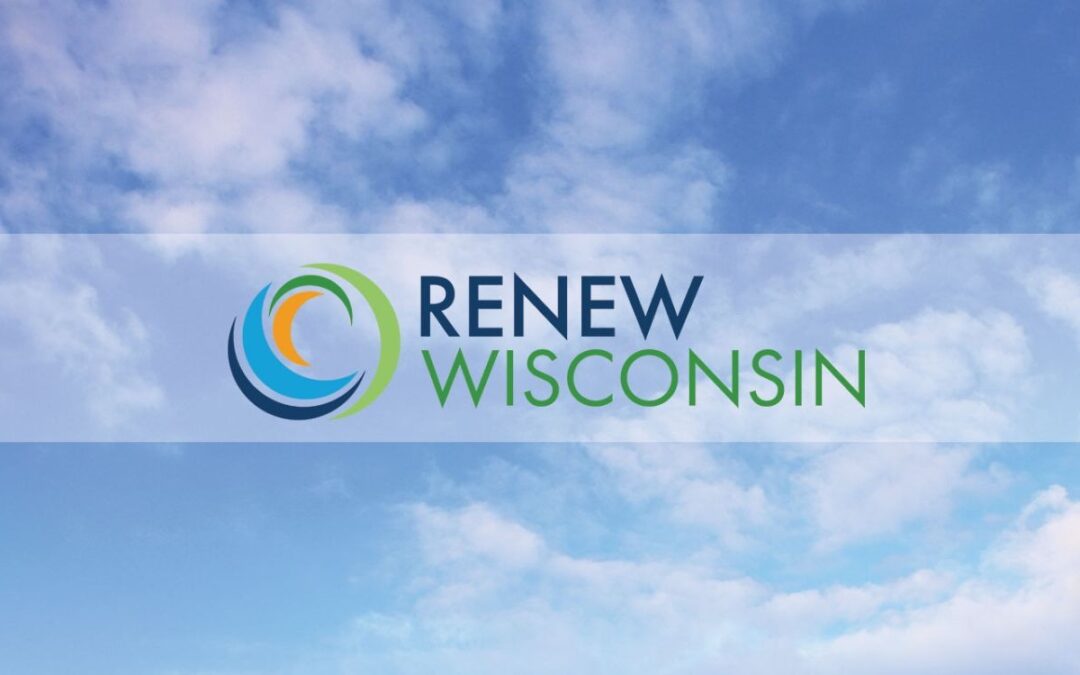
by RENEW Wisconsin | Aug 15, 2022 | Advocacy, Community, Electrification, Policy, Press Release, Renewables
After decades of inaction punctuated by occasional half-measures, Congress has passed monumental legislation committing the nation to pursue a clean energy transformation that will benefit all sectors of American society.
The enactment of the Inflation Reduction Act, which cleared the House of Representatives today, will signal to the rest of the world that the United States is “all in” on decarbonizing the domestic economy while greatly expanding investment and career opportunities in the clean energy arena.
Specifically, this legislation represents a 10-year commitment to scaling up the deployment of clean energy technologies, electric vehicles, and electrified heating and cooling systems produced and delivered by U.S. companies.
With its emphasis on strengthening America’s productive capacity and workforce to deliver clean energy to our fellow citizens, this legislation is genuinely an industrial-strength response to the climate emergency enveloping our planet.
We at RENEW look forward to working collaboratively with federal and state agencies, businesses, farmers, local governments, and schools to help deliver the benefits of the clean energy transformation to every Wisconsinite.
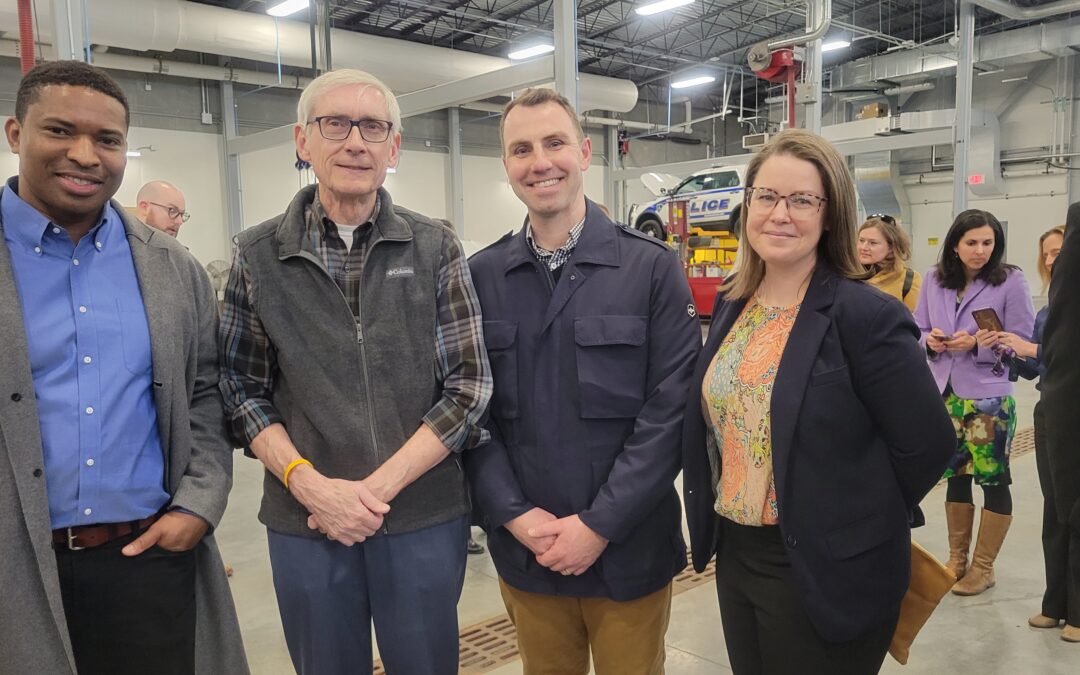
by Heather Allen | Apr 19, 2022 | Electric Vehicles, Energy Storage, Focus on Energy, Jobs, Legislative Watchlist, Local Government, Microgrids, Policy, Press Release, Renewables
Today, Governor Tony Evers introduced Wisconsin’s first-ever Clean Energy Plan. The plan was developed with input from hundreds of stakeholders and provides a pathway for Wisconsin to build a robust clean energy workforce, save billions of dollars, and become more energy independent.
Building a Clean Energy Workforce
The Clean Energy Plan developed by Governor Evers and the Office of Sustainability and Clean Energy (OSCE) identifies opportunities to grow Wisconsin’s clean energy workforce. Wisconsin’s clean energy workforce is 76,000 strong, with good-paying, resilient jobs like installing solar and electric vehicle charging stations, servicing wind turbines, manufacturing energy storage systems, and retrofitting buildings. Wisconsin can take control of its energy future and expand local job creation by investing in renewable energy.
EnTech Solutions, a division of Faith Technologies Incorporated (FTI) based in the Fox Valley, is a leader in distributed energy capabilities, eMobility charging, innovative sustainable fuel technologies, and asset management solutions for businesses looking for reliable, clean energy solutions. “EnTech Solutions is growing to satisfy the high demand for emerging technologies like microgrids, distributed energy systems, and renewable energy EV chargers,” said Tom Clark, chief experience officer with FTI. “Our clean energy workforce develops innovative solutions to solve our customers’ energy challenges.”
The Clean Energy Plan will generate 40,000 new jobs in Wisconsin by 2030, or 6,000 new jobs per year. The plan will create a Clean Energy Workforce Advisory Council and strengthen the workforce with apprenticeship tracks and reentry training for formerly incarcerated individuals. Demand for clean energy workers in Wisconsin is high and growing. State leadership will ensure Wisconsinites have access to training and jobs to help them embark on clean energy careers.
Save Wisconsinites Money
The Clean Energy Plan will accelerate renewable energy and energy efficiency solutions in commercial, residential, and multifamily new construction. Wisconsin families and businesses can save money on monthly energy bills with renewable energy investments, energy efficiency measures, and demand response technologies.
A recent study by Synapse Energy Economics Inc. found that greater investment in Focus on Energy, Wisconsin’s energy efficiency and renewable energy program, would help Wisconsin reap millions in benefits through avoided utility costs, job creation, economic investment, and reduced air emissions. Overall, the report found that if Wisconsin doubled the Focus on Energy budget, the state would receive $340 million in net benefits over one year or $3.4 billion over ten years. The expanded incentives for Focus on Energy outlined in the Clean Energy Plan would create a clean, efficient Wisconsin energy economy for everyone!
Reduce Dependence on Fuel Imports
Wisconsin can be free from the instability of oil and natural gas by investing in renewable energy and electric transportation. Wisconsin currently spends billions of dollars every year to import fossil fuels. The Clean Energy Plan will focus state investments on homegrown, renewable energy and electric vehicle infrastructure.
The Clean Energy Plan will speed the deployment of electric vehicles and charging stations around Wisconsin. The plan lays out strategies for state agencies and local governments to lead the way to build a comprehensive infrastructure for electric vehicle charging stations that will reduce the state and individual dollars spent annually on importing oil and gasoline.
We congratulate Governor Evers and all contributing stakeholders on developing this comprehensive Clean Energy Plan. RENEW is poised to help advance renewable energy, and we look forward to collaborating with state agencies and other partners to build Wisconsin’s clean energy future.
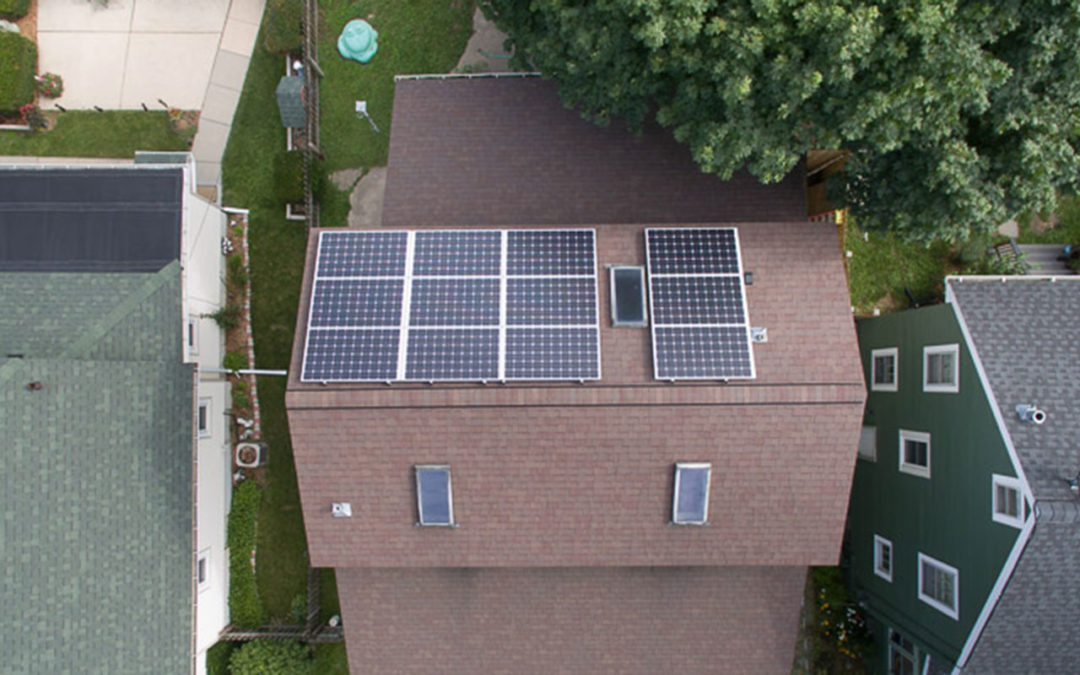
by Andrew Kell | Mar 18, 2022 | Advocacy, Policy, PSC Priorities, Public Service Commission, Solar
In June of 2020, the Public Service Commission of Wisconsin (PSC) opened an investigation into parallel generation (docket 5-EI-157). Parallel generation refers to distributed generation (DG) that is sited at a customer’s premises and can 1) produce energy for the customer’s energy use, and 2) produce and sell to the utility energy that exceeds the customer’s use. The most common type of DG is a solar photovoltaic (PV) rooftop system.
According to the PSC Notice of Investigation, this ongoing parallel generation investigation aims to gather information on costs, markets, emerging technologies, and barriers to DG in the state. A January 2021 RENEW blog described the initial activities in the docket.
After gathering information, the PSC made an initial decision in the docket to further explore:
- avoided costs and buyback rates for DG;
- net metering;
- contracts; and
- consistent terminology and terms of service across the state.
To better understand the value of DG, the PSC directed the five largest investor-owned utilities in Wisconsin to provide modeling and calculations of ‘avoided costs’ and revise the rates at which the utilities purchase energy from DG (also called ‘buyback rates’).
The utility’s buyback rate is a critical economic variable for DG. When homeowners and businesses entertain the idea of solar generation on their rooftops, they must first consider the costs and benefits of installation. The principal economic benefits of installing solar are reducing the energy you buy from the utility and getting paid for the excess energy you sell to the utility. Outside of the net energy billing services available for small installations, most utilities in Wisconsin pay very little for the energy they purchase from DG customers. Utility payments to DG customers don’t recognize the value of local, clean energy, which then oppresses the development of DG and hinders the advancement of carbon reduction goals.
It became apparent that upcoming PSC decisions would reset buyback rates and influence the business case for DG in Wisconsin, potentially for decades to come. As a result, RENEW put together a plan to participate in the utility cases and contracted with GridLab and Synapse Energy Economics to provide expert testimony on the issues.
When the utilities filed their buyback rate applications in early September last year, there were no major surprises to the clean energy community. Rather than model and calculate the long-term avoided costs of local, renewable DG, as the Commission requested, utilities either cited short-term marginal prices for some costs or simply stated that DG provides no value for other costs. RENEW needed to do more than simply critique the utility applications. The RENEW team developed a complete counterproposal for the Commission’s consideration, premised on criteria established by the Commission and just, reasonable buyback rates for DG customers.
Over several months, RENEW collaborated with its consultants and Keyes & Fox, a firm dedicated to clean energy law. Focusing on the Commission’s conceptual framework of avoided energy, generating capacity, and transmission costs, RENEW’s team gathered information, developed and ran market models, and calculated buyback rates. This ensured that RENEW’s proposal would meet the Commission’s requirements and recognize the actual value renewable DG provides to all utility customers.
These efforts resulted in a comprehensive framework for the Commission to consider and adopt for all utilities across Wisconsin. The RENEW team is now submitting testimony and evidence to support this comprehensive framework in all five utility cases.
RENEW now needs your support! The Commission will soon open the public comment period for these five cases and needs to hear from clean energy organizations, climate activists, businesses, and residents across Wisconsin. Below is a list of the five utility cases. RENEW will update the list with dates and direct links to make public comments when the public comment period becomes known. Since Commission decisions in these cases will set a precedent for all utilities in Wisconsin, we encourage you to comment on all 5 cases.
Click on applicable links below to submit comments for each utility.
Energy Policy Nerd Alert!
If you are interested in reading through the details of RENEW’s testimony filings, below are links to direct testimony filings for the case proceeding first (Xcel Energy, aka Northern States Power Company-Wisconsin). Testimony for other cases mentioned above will be available at a later date.
Direct Testimony of Andrew Kell
Direct Testimony of Michael Vickerman
Direct Testimony of Divita Bhandari (Synapse consultant)
Direct Testimony of Rachel Wilson (Synapse consultant)
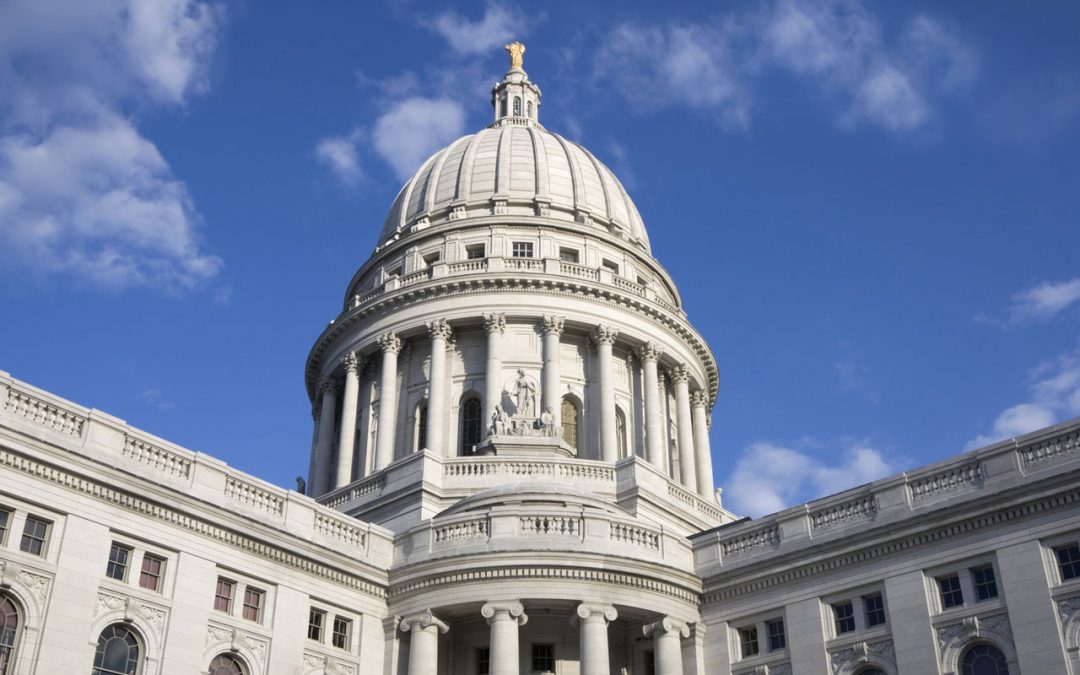
by Jim Boullion | Mar 18, 2022 | Advocacy, Community Solar, Electric Vehicles, Energy Storage, Legislative Watchlist, Local Government, Policy, Solar
The 2021-22 legislative session in Wisconsin is now over. It was a busy session for clean energy initiatives with legislation introduced to allow more community solar, clarify the rules for leasing solar equipment, and update the regulations for electric vehicle (EV) chargers. Most of these bills were bipartisan, with support on both sides of the aisle. See the bottom of this article for a summary of this year’s major clean energy legislation.
The session started when Governor Tony Evers introduced his 2021-23 Budget Bill in February 2021. It included 28 provisions (many of them drawn from the Governor’s Taskforce on Climate Change) that would have advanced Wisconsin’s clean energy and energy efficiency. Among those provisions were recommendations to expand Focus on Energy, invest in the clean energy workforce, and support Wisconsin’s electric vehicle infrastructure. Unfortunately, by the time the Governor signed the Budget in July, those provisions were removed from the Budget and did not pass.
On November 15, several Democratic legislators introduced a package of 22 bills called Forward on Climate. The package proposed increased funding for Focus on Energy, on-bill financing of energy efficiency improvements from utilities, and a Wisconsin Climate Corp to provide training and opportunities in clean energy industries for Wisconsin’s youth. The session ended without any of these bills being adopted. Still, it outlined what kinds of initiatives they support to create good, family-supporting jobs, reduce inequality, and fight climate change through Wisconsin-centered policies.
What passed and what progress was made?
The only major clean energy bill that passed this session was a bill to modernize the PACE financing program. However, many clean energy initiatives made in-roads with legislators from both sides of the aisle. The new technology developments and dropping prices for renewable energy over the last few years is an excellent story for reducing emissions, bolstering economic growth, diminishing energy prices, and creating jobs. Even if there are still hurdles to overcome, everyone is interested in learning more.
There is growing interest among a wide range of stakeholders in clean energy legislation. The best example is SB 490, the community solar bill, where many diverse interests have registered in support. While some groups have expressed concerns with the bill, most business and public interest groups who registered support this kind of change.
Even though we didn’t pass them this session, electric vehicle legislation is also getting attention, especially in light of the volatile gas prices this year. As the price of EV battery production falls, the initial price of EVs will get more competitive, making the cost of EV operations compared to petroleum-powered vehicles very attractive.
The EV transition is coming fast, and we need to be ready. We need to finalize the rules and regulations over EV charging, determine how to pay for the roads if the gas tax generates less income, and streamline the buying process for new EVs coming into the market. One of the big things happening in the coming year is the millions in federal Infrastructure Investment and Jobs Act money coming to Wisconsin for EV infrastructure. We need to work with all stakeholders to ensure that Wisconsin can utilize that money efficiently.
What happens next?
Over the summer and fall, RENEW Wisconsin will meet with candidates running for state and federal office. We will be educating them about new developments in clean energy and electric vehicles and discussing essential policy changes we need to make these advances available to everyone in Wisconsin.
You can also do your part by getting involved in your local elections, talking to your local candidates, and supporting the candidates who support clean energy with your votes, time, and financial contributions. This time of year, candidates are especially interested in what you have to say and will take the time to listen. Clean energy can have a big year in 2023, but only if we do the work this year to educate and help elect candidates who will support us!
If you would like information on any clean energy issues or the elections, please contact Jim Boullion, Director of Government Affairs, jim@renewwisconsin.org,
2021-22 Wisconsin Legislative Session
Clean Energy and Electric Vehicle Issue Summary
PACE Financing Modernization – (SB 692/Wisconsin Act 175 – Sen. Cowles and Rep. Thiesfeldt)
- Expands type of projects that may be financed: Adds energy reliability improvements, weather-related resiliency projects, electric vehicle charging infrastructure, and stormwater control measures.
- Financing: Defines the term of the repayment period, clarifies that financing may be repaid through a lien, and ensures that mortgage holders provide written consent before the issuance of funding.
- Performance Requirements: Removes the requirement for project savings to exceed project costs and would instead require a third-party assessment of the anticipated energy and water cost savings from the proposed project and confirmation of proper installation after work is completed.
- Excludes Residential PACE: Prohibits PACE financing for residential units of less than five units. PACE loans will remain only for commercial or industrial buildings.
Assembly: Passed on voice vote (2/23/2022) and sent to Governor for signature.
Senate: Passed 32-0 on 2/15/22.
RENEW Position: Support.
EV Charging Rules – (SB 573 – Sen. Cowles and Rep. VanderMeer) Clarify that selling electricity by the kilowatt-hour to electric vehicles (EVs) does not subject EV charging station owners to utility regulation. No city, village, town, county, school district, special purpose district, or state agency may own, operate, manage, lease or control a charging facility. Local governments can authorize a utility or private entity to operate a charger on their property. Requires that all energy come from the local utility, limiting Solar+Storage EV charger availability.
Senate: Passed on vote of 19-13 (2/15/2022). Did not concur with Assembly Amended bill 3/8/22
Assembly: Passed on voice vote, with amendment, (2/24/22). Failed to pass.
RENEW Position: Oppose due to restrictions on non-utility energy sources and restrictions on the State and local governments from owning or operating EV chargers.
Expanded Development of Community Solar – (SB 490 / AB 527 – Sen. Stroebel and Rep. Ramthun) Would authorize the development of non-utility-owned community solar projects, allowing more individuals and businesses to access clean energy, save money and create good-paying jobs. Require local investor-owned utilities (Cooperative and municipal utility territories would be exempt) to provide credits on utility bills of subscribers for the energy generated by the system. Directs the PSC to develop rules that will establish fair credit rates and compensation to utilities for the use of utility infrastructure and billing.
Assembly: Energy and Utilities. Failed to pass.
Senate: Utilities, Technology, and Telecommunications. Failed to pass.
RENEW Position: Support
3rd Party Financing/Leasing – (SB 702 / AB 731– Sen. Cowles and Rep. Cabral-Guevara) Clarify that 3rd party financing/leasing of renewable energy equipment is legal in Wisconsin.
Assembly: Energy and Utilities. Failed to pass.
Senate: Utilities, Technology, and Telecommunications. Failed to pass.
RENEW Position: Support
Energy Storage Sales Tax Exemption – (SB 672 /AB 710 – Sen. Cowles and Rep. Duchow) Clarify that battery storage devices installed as part of a renewable energy system should be included in the sales tax exemption for renewable energy system equipment.
Assembly: Committee on Ways and Means. Failed to pass.
Senate: Committee on Financial Institutions and Revenue. Failed to pass.
RENEW Position: Support
Use $10 million of VW Settlement Funds for EV Charging Station Grants – (SB 663/AB 695 – Sen. Cowles and Rep. VanderMeer) Grants from these funds will be used to install electric vehicle charging stations at key locations throughout Wisconsin. Requires the PSC and DOT to study how the growing number of EVs will impact the transportation fund and determine methods to ensure they contribute to that fund equitably. Grant recipients can only resell electricity obtained from the local electric utility. $5m for EV Corridors; $3m for businesses or multifamily; $2m to be determined by PSC.
Senate: Committee on Transportation and Local Government. Passed committee 5-0. Failed to pass.
Assembly: Committee on Energy and Utilities. Failed to pass.
RENEW Position: Support
Direct Purchase of Electric Vehicles – (SB 462 / AB 439 – Sen. Kooyenga and Rep. Neylon) Would enable electric vehicle manufacturers to deliver and service vehicles in Wisconsin using online sales or manufacturer-owned dealerships without going through a 3rd party dealership.
Senate: Senate Gov. Operations Committee. Passed Committee 4-1. Failed to pass.
Assembly: Committee on Transportation. Failed to pass.
RENEW Position: Support
Create a System to Measure Carbon Emissions for Animal Agriculture Operators. (SB1054 / AB 1072 – Sen. Cowles and Rep. Tauchen).
- DATCP shall establish voluntary and market-driven standards for quantifying the carbon emissions produced directly and indirectly from an animal agriculture operator’s activity.
- DATCP must facilitate trade in products and services related to transactions between animal agriculture operators and other parties for carbon emission offsets and may operate an electronic marketplace for selling and purchasing carbon emission offsets.
- PSC shall develop a statewide master plan for collecting, transporting, and commercializing renewable natural gas produced from animal wastes, biomass, and other organic sources.
- PSC will establish standardized power purchase agreements and standardized agreements for the provision of energy as a service between animal agriculture operators and electric utilities
Assembly: Committee on Energy and Utilities. Failed to pass.
Senate: Committee on Natural Resources and Energy. Failed to pass.
RENEW Position: Support
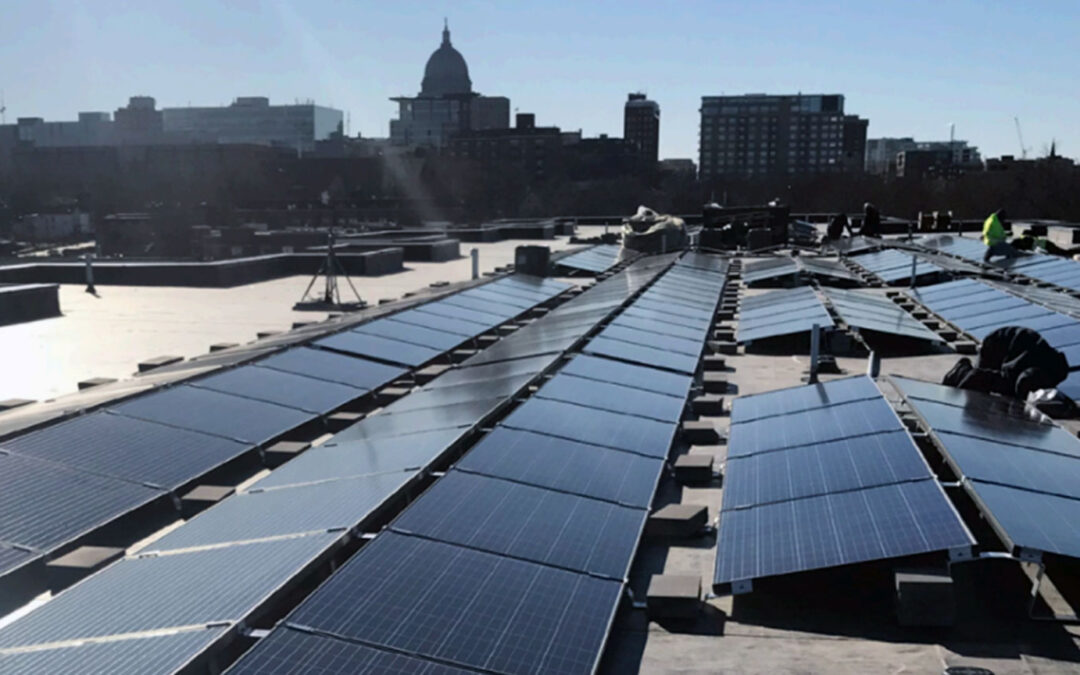
by Jim Boullion | Feb 16, 2022 | Policy, Press Release, Solar, Utilities
The Wisconsin State Senate demonstrated unanimous support for clean energy today with the passage of SB 692, which updates Wisconsin’s Property Assessed Clean Energy (PACE) program. The bill now moves to the State Assembly, where similar bipartisan support could pass the bill before the end of the session.
“We are excited to have bipartisan, unanimous support for this clean energy financing option which will help Wisconsin businesses shift to clean energy and drive economic investment. We thank Senator Cowles for introducing this legislation which demonstrates the broad appeal of common-sense clean energy solutions,” said Heather Allen, Executive Director of RENEW Wisconsin.
PACE financing creates a mechanism for commercial, industrial, health care, agricultural, nonprofit, and multifamily property owners to obtain low-cost, non-recourse financing for up to 100% of the cost of energy efficiency and renewable energy improvements. Financing options up to 30 years yield positive cash flows and increase the net operating income for commercial and industrial building owners. PACE loans are attached to the property, not the person, allowing the remaining cost of those improvements to transfer to a new owner if the property is sold.
SB 692 will improve access to PACE financing in Wisconsin by adding clarity and expanding eligibility.
Among other changes, the legislation:
- Expands the type of projects that may be financed to include energy reliability improvements, weather-related resiliency projects, electric vehicle charging infrastructure, and stormwater control measures.
- Defines the term of the repayment period, clarifying that financing may be repaid through a lien, and ensures that all mortgage holders provide written consent before the issuance of funding.
- Removes the requirement for energy and water savings to exceed project costs and would instead require that the owner obtain a third-party assessment of the anticipated energy and water cost savings from the proposed project and provide confirmation of proper installation after work is completed.
- The bill also prohibits PACE financing for residential units of less than five units. Wisconsin does not currently have a residential PACE program. In the few states that have tried implementing a residential program, problems developed when individual homebuyers did not fully understand the implications of a PACE loan.
“Regular updates to our energy laws and financing programs like PACE allow Wisconsin’s citizens to benefit from the many advancements in clean, affordable renewable energy and energy efficiency technologies,” said Jim Boullion, Director of Government Affairs.
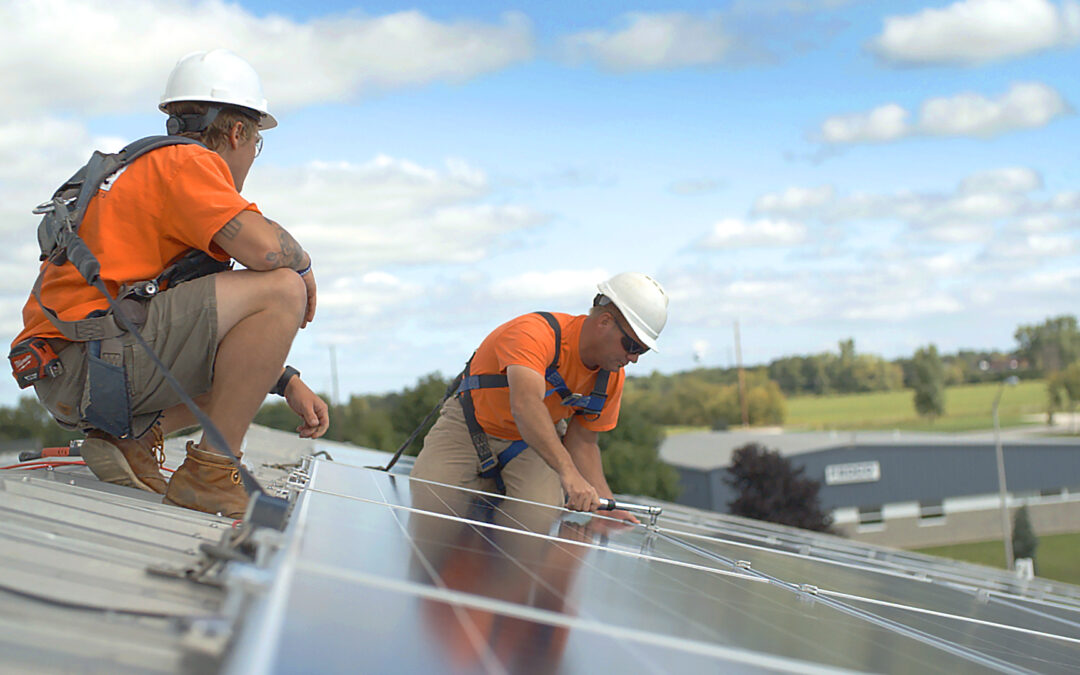
by Heather Allen | Feb 2, 2022 | Advocacy, Legislative Watchlist, Local Government, Policy
Federal clean energy and climate investments are more crucial than ever. Congress must deliver a deal that includes clean energy investments in the Build Back Better Act.
This is a make-or-break moment to shore up the electric grid and help accelerate renewable energy and energy efficiency adoption in the U.S. These investments will make the difference between leading the global clean energy economy or lagging behind the rest of the world.
According to the Solar Energy Industry Association, the Build Back Better Act would drive $234 billion into the economy over the next four years and require at least 450,000 workers to get it done – double the size of today’s solar workforce!
In the last few weeks of 2021, the Build Back Better Act (Biden’s flagship climate and clean energy proposal) hit roadblocks. Regardless of the political stalemate, the critical importance of the Act’s clean energy and climate provisions cannot be overstated. As Stewart MacKintosh wrote in The Hill, “Achieving global climate change goals depends on the U.S. starting to implement Biden’s net-zero carbon emissions plan today- not two (or god forbid) four or more years from now. We have no extra time.”
The Build Back Better (BBB) Act is the third and most ambitious part of Biden’s original Build Back Better plan, including COVID-19 economic relief, social services, welfare, and infrastructure. Significant portions of the agenda were signed into law with two bills in 2021, The American Rescue Plan Act (March 2021) and the Infrastructure and Jobs Investment Act (November 2021).
BBB is the most powerful tool the Federal Government has in play to curb U.S. emissions and reach the climate and clean energy goals established in the Paris Agreement. BBB provisions would mobilize billions of dollars to expand access to clean energy and electric vehicles, improve the efficiency of buildings, electrify heating and cooling, support American clean energy industry growth, and help American manufacturers and other businesses reduce energy use and emissions. BBB also contains funding for social infrastructure, environmental justice investments, natural climate solutions, and rental assistance.
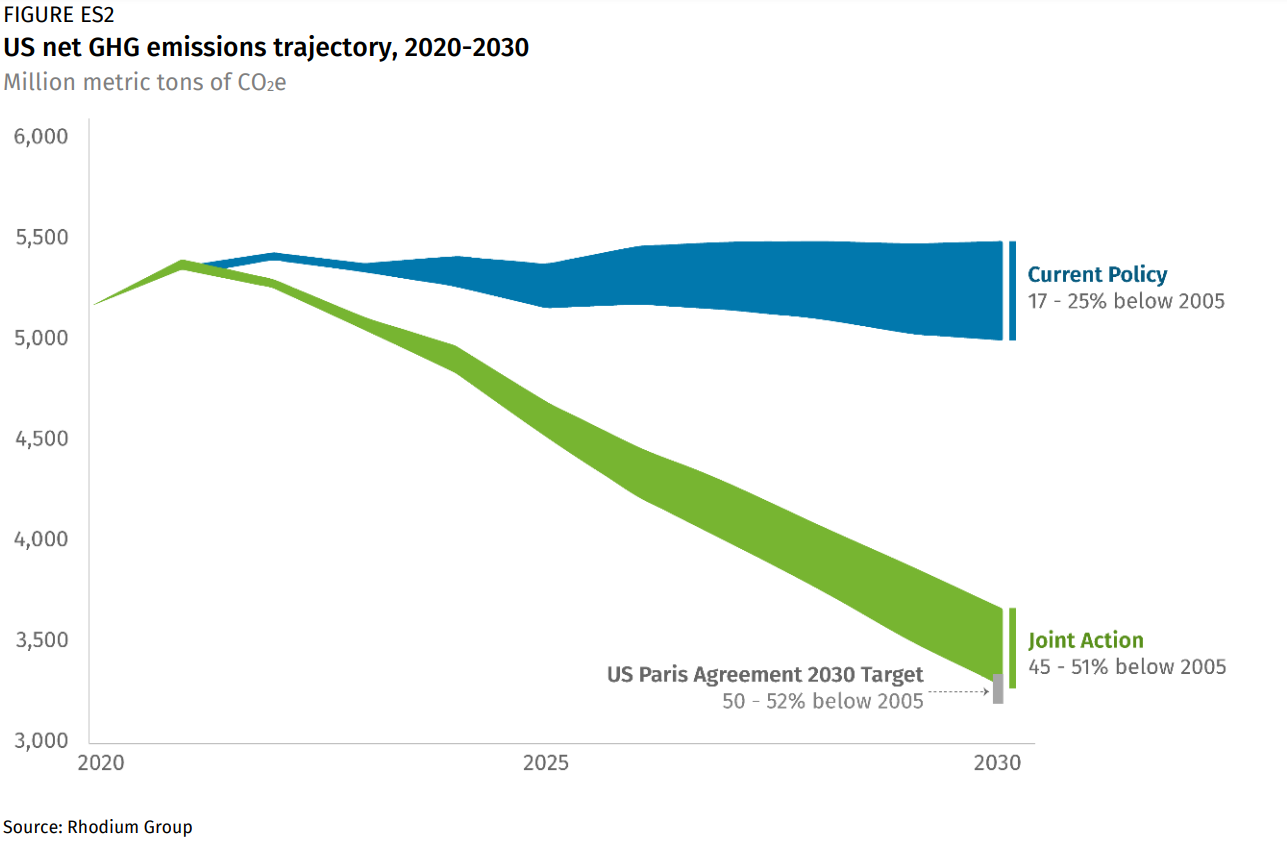 Image/Figure from https://rhg.com/research/us-climate-policy-2030/
Image/Figure from https://rhg.com/research/us-climate-policy-2030/
This figure from the Rhodium Group shows that “Joint Action” can reduce emissions by 50% below 2005 levels. Joint Action refers to the collective impact of legislation adopted in 2021, BBB climate and clean energy provisions, and state and local action. BBB is the most critical element in this suite of actions and will accelerate clean energy adoption, save money for consumers, and reduce emissions.
Businesses and Workers Support Build Back Better
Last summer, Wisconsin businesses signed a letter calling on Congress for ambitious clean energy investments. Since that time, an increasing number of companies and organizations have signaled their support for clean energy investment to drive jobs and economic activity.
West Virginia coal miners called on Joe Manchin to support Build Back Better.
Provisions in the bill would support miners dealing with Black Lung Disease, provide incentives to develop clean energy projects on closed mines, and support the right to unionize.
400 companies signed a letter calling on lawmakers to pass Build Back Better.
“The climate components of the Build Back Better package are both fiscally responsible and critically needed to ensure a stable climate for businesses and communities, help companies save money with affordable clean energy, and strengthen U.S. competitiveness by building upon the important measures in the infrastructure package that passed Congress this fall,” said Hugh Welsh, president and general counsel, DSM North America.
Wisconsin’s solar installers, in particular, recognize that Build Back Better will provide greater access to clean energy, especially for farms and low-income families.
“The extension of the business and residential tax credits for solar are critical for our industry. But adding refundability to both 48C and 25D is a game-changer for low and moderate-income households, farms, and other entities that don’t have the tax liability to realize the normal tax credits and finally enables them to go solar. It has the potential to bring the equitable distribution of the benefits of solar to millions.” Josh Stolzenburg, CEO Northwind Solar, Amherst, Wisconsin.
Contact your senator today and ask them to support climate and clean energy provisions of Build Back Better. There is no time to waste.







